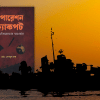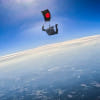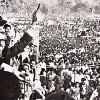Unfinished agenda of the Liberation War
Forty five years ago, at zero hour on March 26, 1971, Pakistan Army launched one of the most heinous genocides in human history which could put Halaku and Hitler to shame due to the scale of the carnage. During nine months of barbarity, three million Bangladeshis were killed, four hundred thousand women were raped, as a result of which more than seventy thousand war babies were born, and Bangladesh was ravaged.
The USA and China supported Yahya Khan's military junta in the savagery. US President Richard Nixon and his National Security Advisor (NSA), Henry Kissinger, ignored the public and media opinion. However eminent leaders and citizens like Edward Kennedy, George Harrison, Bob Dylan and numerous others in the USA and all over the world supported the cause of the Bangladeshis. The reason for Nixon turning a blind eye to Yahya's misdeeds was Pakistan's facilitation of a historic secret visit of Kissinger to Beijing in July 1971. The new found bonhomie between USA and China was a significant alliance against the Soviet bloc and its de-facto supporters like India. Being under obligation to Yahya, Nixon ignored US Congressmen, his Secretary of State and the world opinion when Bangladesh was being devastated by the Pakistan army and their collaborators.
India, with USSR's cooperation, came out in support against all odds for the cause of Bangladesh liberation. Despite being a poor nation, India shared whatever it had with their Bangladeshi brothers and sisters, and opened its door for the refugees whose numbers rose to ten million by November 1971. New Delhi helped in establishing the provisional government of Bangladesh which was operating from Kolkata. The Indian army provided all assistance in raising, organising, training and equipping Mukti Bahini (the Bangladesh Liberation Force). By the end of November 1971, Bangladesh forces were organised in three Infantry Brigades with requisite artillery, one hundred thousand guerrillas and seven sectors deployed along the Indo-Bangladesh border for facilitating guerrilla operations. Bangladesh also had a small navy and air force. With the formation of joint command of Indian and Bangladeshi forces in November 1971, the noose around the Pakistan occupation army was tightened.
The military junta had whitewashed the news of genocide in West Pakistan. Due to the jingoistic statements of military commanders, war hysteria was created in the West Pakistan where frenzied "Crush India" slogans were raised. On December 3, 1971, Yahya Khan ordered air attacks on eight Indian airfields. The Joint Forces were waiting for such provocation and launched their multi-pronged offensive from all directions to liberate Bangladesh. The Indian Navy blockaded the Bay of Bengal and the Indian Air Force pounded the Pakistanis from the skies. The whole affair was finished by the Joint Forces in just 12 days, forcing all 93,500 ranks of the Pakistan Army's to surrender. The victory was gained against all odds. The US dispatched its mightiest naval task force of the Seventh Fleet to the Bay of Bengal. It was supported by Great Britain, which dispatched its Royal Navy armada to the Arabian Sea. Both naval forces were checkmated by the USSR's navy, forcing the British armada to make a U-turn and the seventh fleet downing its anchors in the mid of the Bay of Bengal.
China made noises on India's Himalayans frontiers, which were contained by India and countervailed by the USSR, by deploying its forces on the Sino-USSR border. The clouds of a nuclear war were on the horizon. But the biggest challenge was on the diplomatic front. In the UN, all western countries, allies of the USA, and the Muslim nations formed a bloc to strangulate Indo-Bangladesh forces' attempts to liberate East Pakistan. However, these moves were stalled with the usage of veto power by the USSR and skilful diplomatic manoeuvring by India.
Despite losing in numerous battles, the sadistic genocide activities of Pakistan Army continued until the end of war. A day prior to their surrender, the Pakistani occupying force picked up numerous Bangladeshi intellectual and prominent citizens, and killed them in cold blood. After the war, 194 army personnel, three from the Pakistan Air Force and three from the Pakistan Navy were identified as war criminals. This, however, did not include the name of Lt Gen Tikka Khan, who wore the twin hats of being the Chief Marshal Law Administrator and Commander of Pakistani forces in Bangladesh from March 26 to 11 April 1971. He was the mastermind behind the butchering of hundreds and thousands of civilians. Having been let off, he later earned the sobriquet of the 'Butcher of Baluchistan', where he again killed thousands of innocent people.
India and Bangladesh wanted to try the war criminals as per international laws, but Pakistani President ZA Bhutto convinced Indira Gandhi that Pakistan would conduct trials on its own soil. But this promise turned out to be a false promise. With Sheikh Mujibur Rahman, Bhutto tried completely different tactics. He held prominent Bangladeshi citizens, who were in West Pakistan at the time of the war, hostage and bargained for the release of Pakistani Prisoners of War from Indian camps. Numerous rounds of talks, initially bilateral between India and Pakistan, and India and Bangladesh, and subsequently joint parleys amongst the three countries, resulted in an agreement to release the war criminals for "ushering an era of peace and tranquillity in the sub-continent".
Releasing the war criminals was a terrible folly. Barring few senior officers among them, who were sacked for professional incompetence and not war crimes, the services of all others were continued. Some of them became Major Generals and Lt Generals. Some of these officers were also alleged to be behind the conspiracy to murder Sheikh Mujibur Rahman and his kin in August 1975. They also allegedly orchestrated the Sikh militancy in Punjab, which ultimately resulted in the assassination of Indira Gandhi on October 24, 1984. Thus instead of "ushering an era of peace and tranquillity", the release of the war criminals resulted in unleashing the reign of terror. There is hardly any family in Bangladesh which had not been affected by the Pakistani genocide. However, the surviving perpetrators of the war are still enjoying luxurious retired life on the wealth looted from Bangladesh.
Prime Minister Sheikh Hasina's efforts in trying the 1971 collaborators are commendable. But the agenda of the Bangladesh Liberation War will remain unfinished until all the war criminals are brought to justice.
The writer is a retired Brigadier General of the Indian Army. He participated in the Liberation War of Bangladesh.

 For all latest news, follow The Daily Star's Google News channel.
For all latest news, follow The Daily Star's Google News channel. 








Comments